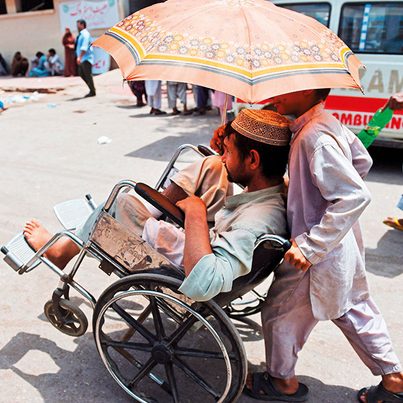As a lawyer in Pakistan, I have seen the challenges that individuals with disabilities face when it comes to accessing public places. In Karachi, in particular, many public places are not as accessible as they should be, making it difficult for individuals with disabilities to fully participate in society and access the resources they need.
Fortunately, there are laws in place in Pakistan that are designed to promote greater accessibility and inclusion for individuals with disabilities. The Disabled Persons (Employment and Rehabilitation) Ordinance, 1981, for example, prohibits discrimination against individuals with disabilities in employment, education, and other areas. Additionally, the Accessibility Code for the Built Environment of Pakistan, which was introduced in 2006, lays out specific guidelines for ensuring that public buildings and spaces are accessible to individuals with disabilities.
Despite these legal protections, however, many public places in Karachi are still not as accessible as they should be. This can include everything from buildings with steps and narrow doorways that make it difficult for individuals with mobility impairments to enter, to public transportation systems that are not designed to accommodate individuals with disabilities.
One area where accessibility continues to be a major concern is in the realm of education. While the Education Policy of 2009 calls for inclusive education for all children, regardless of disability, in practice many schools in Karachi are not equipped to meet the needs of students with disabilities. This can be due to a lack of resources, as well as a lack of awareness and understanding among educators about how to effectively support students with disabilities.
Another area where accessibility is a concern is in the realm of employment. While the law prohibits discrimination against individuals with disabilities in the workplace, in practice many employers are not equipped to accommodate the needs of individuals with disabilities. This can include everything from physical accommodations, such as wheelchair ramps and accessible restrooms, to accommodations related to communication and technology, such as the use of assistive devices and software.
Fortunately, there are steps that can be taken to promote greater accessibility for individuals with disabilities in Karachi. One key strategy is to continue raising awareness about the issue of accessibility and the legal protections that exist for individuals with disabilities. This may involve working with businesses and organizations to help them understand their legal obligations, as well as advocating for greater funding for accessibility retrofitting and other related initiatives.
Another important strategy is to work to improve access to education and employment opportunities for individuals with disabilities. This could involve developing targeted programs and initiatives that are designed to support students with disabilities in the classroom, as well as working with employers to help them understand how they can effectively accommodate the needs of individuals with disabilities in the workplace.
Ultimately, the issue of accessibility for individuals with disabilities is one that affects all of us. By working together to promote greater awareness and understanding of this issue, we can help to ensure that everyone has equal access to the resources and opportunities that they need to thrive. As a lawyer with a focus on disability rights, I am committed to doing my part to make this vision a reality, are you?
ABOUT THE AUTHOR:
Ameer Mukhtiar
Advocate
Contributor

